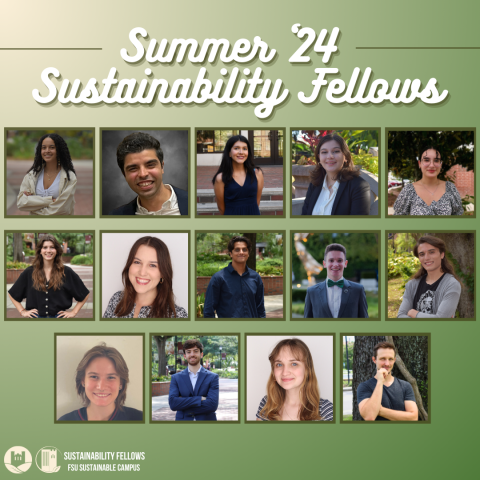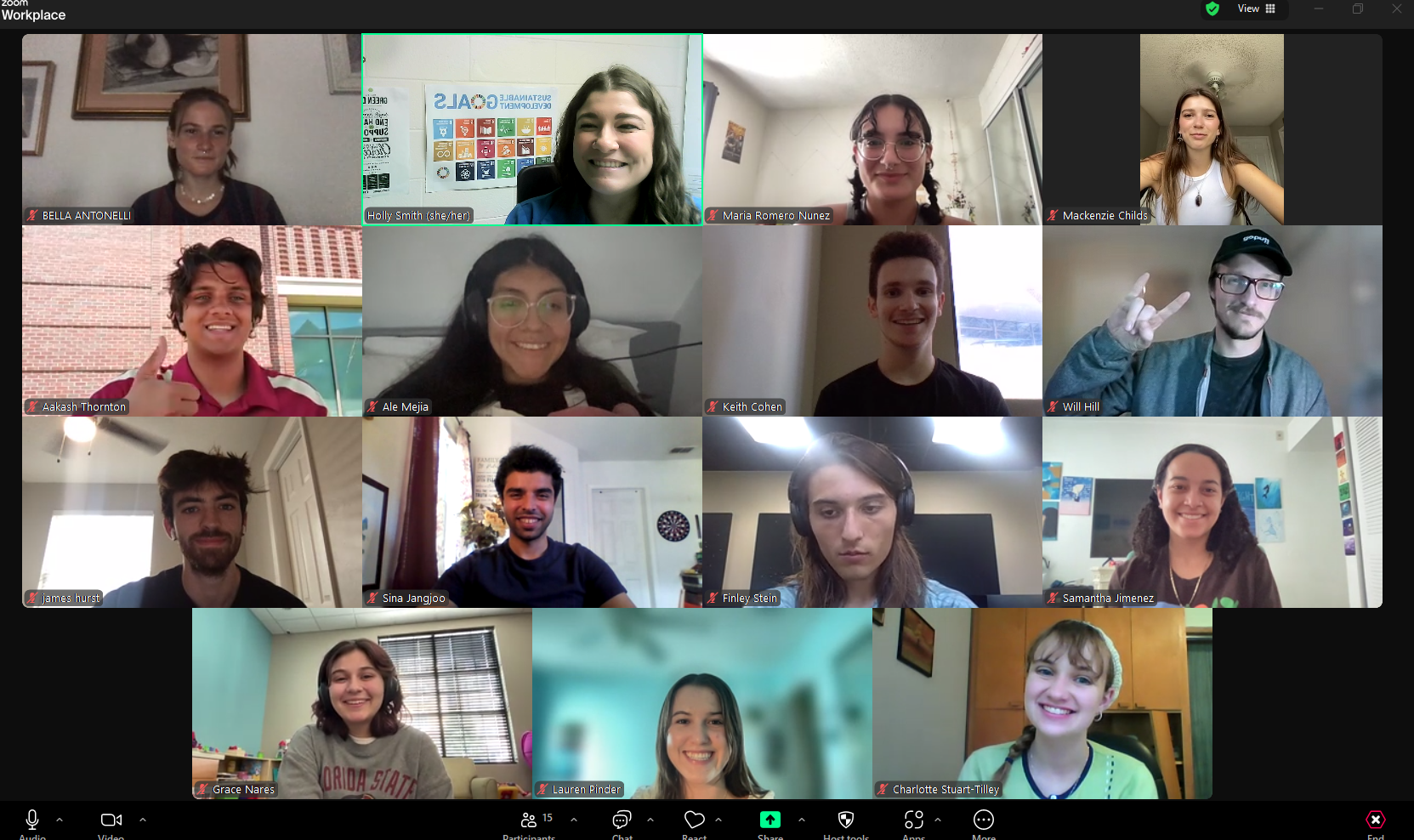Summer 2024 Sustainability Fellows Cohort

During the Summer 2024 semester, fourteen Sustainability Fellows partnered with six campus and community partners to tackle a variety of sustainability challenges. The largest cohort yet, Aakash Thornton, Alejandra Mejia, Bella Antonelli, Charlotte Stuart-Tilley, Finley Stein, Grace Nares, James Hurst, Keith Cohen, Lauren Pinder, Mackenzie Childs, Maria Romero Nunez, Samantha Jimenez, Sina Jangjoo, and Will Hill, came from a multitude of backgrounds to actively engage in research, propose strategies, and identify opportunities for sustainability issues.
The Sustainability Fellows program benefits both students and the organizations they work with. Partners for the Summer of 2024 included the Apalachee Regional Planning Council (ARPC), Florida Rising, Coastal Plains Institute (CPI), the Leon County Office of Sustainability, FSU College of Motion Picture Arts, FSU Food for Thought Pantry (FFTP), and the Florida Department of Environmental Protection (FDEP). Some of these organizations have been partners in the past, while others were new to the program, but all gave glowing reviews for their Fellows.
ARPC focuses on economic development, emergency planning, transportation, and quality of life to meet the needs of the nine-county region. They worked with Thornton, Hurst, and Jangjoo on three different projects. Thornton’s project, Vulnerability Assessment Work for Franklin County and Gadsden County, challenged him to use the Inundate model to evaluate critical asset data and update flood data projections. Hurst collaborated with ARPC to create an online dashboard, based on the content of the existing Apalachee Regional Economic Development Strategy by utilizing ArcGIS Online. Jangjoo conducted Solar Industry Workforce Research to support future vocational training programs in Florida. All three of the projects helped the organization serve citizens and local governments in the form of technical assistance, collaborative preservation, and economic development.
Florida Rising, a voter empowerment organization, wanted to conduct research on viable solutions for the insurance industry that account for the climate crisis and center climate justice. Alejandra Mejia gathered data and made some key recommendations for policies that benefit marginalized communities. 
Pinder and Antonelli are passionate about wildlife conservation and art and had the unique opportunity to combine their passion and skills by working with the Coastal Plains Institute on Field Guide Illustrations. CPI is publishing a field guide with the most common species of plants, invertebrates, amphibians, reptiles, and birds encountered in ephemeral ponds, enabling citizens to identify the species. It is a collaborative project to encourage investment in local ecology and to embrace a feeling of shared commitment.
Leon County has an Office of Sustainability that works to enhance the community’s environmental, economic, and social resilience by promoting the adoption of sustainability practices. Stuart-Tilley assisted them in conducting research to implement a Master Recyclers Class. Recycling is commonplace for most residents, but there are persistent questions and misconceptions around recycling in Leon County. The Master Recyclers class will educate key groups of residents who can spread correct and current information about recycling while dispelling common myths and answering questions. Stuart-Tilley analyzed similar programs in other regions, identified key groups to target for education, and determined the best format to deliver the class.
Stein, Cohen, and Hill are Film students who are all passionate about sustainability. They have embarked on a journey to make the College of Motion Picture Arts more sustainable by implementing film set practices that are in compliance with the PEACHy framework, from the Environmental Media Association Green Seal program. The film industry is going green so implementing eco-friendly film production practices while in college will help FSU Film students to succeed in their future careers.
FSU has a food pantry for students, called the Food for Thought Pantry which has gained another mode of donation via a permanent non-perishable food donation bin in Strozier library. They requested a Fellow to propose and create a marketing campaign to build awareness around the new program and to inform consumers about last mile food waste, food safety factors relevant to donation, and how social and environmental sustainability are intertwined. Jimenez took on this project, using her social media and sustainability knowledge to promote responsible consumption patterns.
Longtime community partner, the Florida Department of Environmental Protection’s Waste Reduction and Recycling Education Section, worked with Childs, Romero Nunez, and Nares on two different projects. Childs and Romero Nunez worked together to develop a recycling program at Nims Middle School. Nare’s project was also a recycling program initiative, but it was designed for Maclay State Park. All three students were able to complete site visits, analyze existing programs, and develop recommendations.
Each of these projects has contributed to advancing sustainability initiatives on FSU’s campus and in the community. The Fellows gained valuable professional experience working on real-world sustainability problems and the partnering organizations were able to get fresh ideas on issues they may lack time, resources, and funding to alleviate.
To view the Summer 2024 Sustainability Fellows presentations, click here.
To learn more about the Sustainability Fellows program, visit sustainablecampus.fsu.edu/sustainability-fellows.
